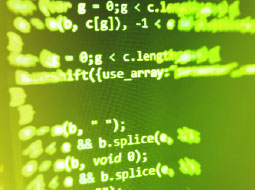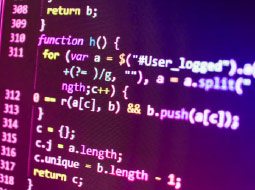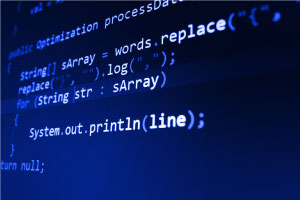Online courses directory (147)
Explore how we have hidden secret messages through history. What is Cryptography?. Probability Space. The Caesar Cipher. Polyalphabetic Cipher. The One-Time Pad. Frequency Stability. The Enigma Encryption Machine (case study). Perfect Secrecy. Pseudorandom Number Generators.
Solve problems using Mathematics, Computer Science and more!. Introduction. The Discovery. Clue #1. Clue #2. Clue #3. Crypto Checkpoint 1. Clue #4. Checkpoint. Crypto Checkpoint 2. Crypto Checkpoint 3. What's Next?. Introduction. The Discovery. Clue #1. Clue #2. Clue #3. Crypto Checkpoint 1. Clue #4. Checkpoint. Crypto Checkpoint 2. Crypto Checkpoint 3. What's Next?.
How have humans protected their secret messages through history? What has changed today?. What is Cryptography?. Probability Space. The Caesar Cipher. Caesar Cipher Exploration. Frequency Fingerprint Exploration . Polyalphabetic Cipher. Polyalphabetic Exploration. The One-Time Pad. Perfect Secrecy Exploration. Frequency Stability. Coin flip sequences. Frequency Stability Exploration. The Enigma Encryption Machine (case study). Perfect Secrecy. Pseudorandom Number Generators. Random Walk Exploration. Ciphers vs. Codes. Shift Cipher. Caesar cipher encryption. Caesar Cipher Decryption. Caesar cipher frequency analysis. Vigenere cipher encryption. XOR Bitwise Operation. XOR & the One-Time Pad. XOR Exploration. Bitwise Operators. What's Next?. The Fundamental Theorem of Arithmetic. Public Key Cryptography: what is it?. The Discrete Logarithm Problem. Diffie-Hellman Key Exchange. RSA Encryption: step 1. RSA Encryption: step 2. RSA Encryption: step 3. Time Complexity (Exploration). Euler's Totient Function. Euler Totient Exploration. RSA Encryption: step 4. What should we learn next?. What is Modular Arithmetic?. Modulo Operator. Congruence Modulo. Congruence Relation. Equivalence Relations. The Quotient Remainder Theorem. Modular Addition & Subtraction. Modular Addition. Modular Multiplication. Modular Multiplication. Modular Exponentiation. Fast Modular Exponentiation. Fast Modular Exponentiation. Modular Inverses. Introduction. Primality Test Challenge. Trial Division. Level 1: Primality Test. Running Time. Level 2: measuring running time. Computer Memory (space). Binary Memory Exploration. Algorithmic Efficiency. Level 3: Challenge. Sieve of Eratosthenes. Level 4: Sieve of Eratosthenes. Primality Test with Sieve. Level 5: Trial division using sieve. The Prime Number Theorem. Prime density spiral. Prime Gaps. Time Space Tradeoff. Summary (what's next?). Randomized Algorithms (intro). Conditional Probability (Bayes Theorem) Visualized. Guess the coin. Random Primality Test (warm up). Level 9: Trial Divison vs Random Division. Fermat's Little Theorem. Fermat Primality Test. Level 10: Fermat Primality Test. What's Next?. What is Cryptography?. Probability Space. The Caesar Cipher. Caesar Cipher Exploration. Frequency Fingerprint Exploration . Polyalphabetic Cipher. Polyalphabetic Exploration. The One-Time Pad. Perfect Secrecy Exploration. Frequency Stability. Coin flip sequences. Frequency Stability Exploration. The Enigma Encryption Machine (case study). Perfect Secrecy. Pseudorandom Number Generators. Random Walk Exploration. Ciphers vs. Codes. Shift Cipher. Caesar cipher encryption. Caesar Cipher Decryption. Caesar cipher frequency analysis. Vigenere cipher encryption. XOR Bitwise Operation. XOR & the One-Time Pad. XOR Exploration. Bitwise Operators. What's Next?. The Fundamental Theorem of Arithmetic. Public Key Cryptography: what is it?. The Discrete Logarithm Problem. Diffie-Hellman Key Exchange. RSA Encryption: step 1. RSA Encryption: step 2. RSA Encryption: step 3. Time Complexity (Exploration). Euler's Totient Function. Euler Totient Exploration. RSA Encryption: step 4. What should we learn next?. What is Modular Arithmetic?. Modulo Operator. Congruence Modulo. Congruence Relation. Equivalence Relations. The Quotient Remainder Theorem. Modular Addition & Subtraction. Modular Addition. Modular Multiplication. Modular Multiplication. Modular Exponentiation. Fast Modular Exponentiation. Fast Modular Exponentiation. Modular Inverses. Introduction. Primality Test Challenge. Trial Division. Level 1: Primality Test. Running Time. Level 2: measuring running time. Computer Memory (space). Binary Memory Exploration. Algorithmic Efficiency. Level 3: Challenge. Sieve of Eratosthenes. Level 4: Sieve of Eratosthenes. Primality Test with Sieve. Level 5: Trial division using sieve. The Prime Number Theorem. Prime density spiral. Prime Gaps. Time Space Tradeoff. Summary (what's next?). Randomized Algorithms (intro). Conditional Probability (Bayes Theorem) Visualized. Guess the coin. Random Primality Test (warm up). Level 9: Trial Divison vs Random Division. Fermat's Little Theorem. Fermat Primality Test. Level 10: Fermat Primality Test. What's Next?.
We've always been communicating.... as we moved from signal fires, to alphabets & electricity the problems remained the same. What is Information Theory?. Prehistory: Proto-writing. Ptolemaic: Rosetta Stone. Ancient History: The Alphabet. Source Encoding. Visual Telegraphs (case study). Decision Tree Exploration. Electrostatic Telegraphs (case study). The Battery & Electromagnetism. Morse Code & The Information Age. Morse code Exploration. What's Next?. Symbol Rate. Symbol Rate Exploration. Introduction to Channel Capacity. Message Space Exploration. Measuring Information. Galton Board Exploration. Origin of Markov Chains. Markov Chain Exploration. A Mathematical Theory of Communication. Markov Text Exploration. What's Next?. What is Information Theory?. Prehistory: Proto-writing. Ptolemaic: Rosetta Stone. Ancient History: The Alphabet. Source Encoding. Visual Telegraphs (case study). Decision Tree Exploration. Electrostatic Telegraphs (case study). The Battery & Electromagnetism. Morse Code & The Information Age. Morse code Exploration. What's Next?. Symbol Rate. Symbol Rate Exploration. Introduction to Channel Capacity. Message Space Exploration. Measuring Information. Galton Board Exploration. Origin of Markov Chains. Markov Chain Exploration. A Mathematical Theory of Communication. Markov Text Exploration. What's Next?.
20th century solutions to new problems in Cryptography. The Fundamental Theorem of Arithmetic. Public Key Cryptography: what is it?. The Discrete Logarithm Problem. Diffie-Hellman Key Exchange. RSA Encryption: step 1. RSA Encryption: step 2. RSA Encryption: step 3. Euler's Totient Function. RSA Encryption: step 4. What should we learn next?.
Why do Primes make some problems fundamentally hard? Build algorithms to find out!. Primality Test. Running Time. Computer Memory (space). Algorithmic Efficiency. Sieve of Eratosthenes. Primality Test with Sieve. The Prime Number Theorem. Time Space Tradeoff. Conditional Probability Visualized.
Learn how to program all the major systems of a robotic car from the leader of Google and Stanford's autonomous driving teams. This class will teach you basic methods in Artificial Intelligence, including: probabilistic inference, planning and search, localization, tracking and control, all with a focus on robotics. Extensive programming examples and assignments will apply these methods in the context of building self-driving cars. This course is offered as part of the Georgia Tech Masters in Computer Science. The updated course includes a final project, where you must chase a runaway robot that is trying to escape!
Go hands-on with web design skills in Adobe Dreamweaver CS5.5 with one of the world's top software trainers!
Great managers are made, not born. Learn about the qualities and skills of great managers in this Business 101 course. Instructor Sherri Hartzell holds both an MBA and Ed.D., so she's an excellent choice to teach you about principles of management.
Start by learning about the different levels of management in organizations and then dive into how good managers lead to great employees. Students of business, budding entrepreneurs and independent online learners alike can benefit from these short, engaging video lessons and interactive online quizzes. Business 101: Principles of Management can prepare you to earn real, widely transferable college credit by taking the Principles of Management CLEP exam or the Excelsior Principles of Management exam .
If you have studied the Introduction to Programming in C course available on ALISON it is now time to further enhance your C programming skills by studying numbers, variables and arrays and the functionality they have in computer programming. In this free online C programming course you will gain a much greater knowledge and understanding of numbers, variables and arrays. You will learn more about the basics of numeric overflow and how numbers are encoded as characters in ASCII. You will learn more about variables and the connection between function return values and variables. You will also review the use of arrays and pointers, how to create a pointer in C, and assign a value to a pointer. This free online C programming course will be of great interest to IT professionals who want to enhance their knowledge and understanding of the C programming language and its functionality, and to those learners who want to follow on from the Introduction to Programming in C course.<br />
In computer science control flow is a very important concept to understand for the development of effective and efficient software programs. Control flow is the order in which individual statements, instructions, or function calls are executed within a piece of software. In this free online computer programming course you will learn more about the use of statements and logic in C programming. You will be introduced to conditional flow statements, the mechanisms for controlling flow statements, and how to implement simple statements in C. Logical operators such as OR, GOTO and the While loop are also discussed in detail. This free online computer programming course will be of great interest to all IT professionals who would like to learn more about the use of control flow when developing software using the C programming language, and to all learners who want to learn more about the procedures used to write effective software programs.<br />
C is a powerful system programming language and is commonly used to programme operating systems such as Unix. One of the main advantages of programming in C is that it allows the programmer to write directly to memory. This means that key constructs such as pointers, constants and strings can be used within the memory in an efficient and machine-independent fashion. This free online computer programming course covers topics such as using pointers for direct memory access and manipulation in C, changing the memory address contained within a pointer and introduces constants and string literals. You will learn why pointers contain memory addresses of multi-byte variables, and how to visualise RAM in a new way. This free online computer programming course will be of great interest to IT and software professionals who would like to learn more about this powerful and efficient programming language, and to all learners who would like to learn more about the kind of programming language that is used to develop operating systems.<br />
This course presents material in discrete mathematics and computation theory with a strong emphasis on practical algorithms and experiential learning. Discrete mathematics, also called finite mathematics or decision mathematics, is the study of mathematical structures that are fundamentally discrete in the sense of not supporting or requiring the notion of continuity. Objects studied in finite mathematics are largely countable sets such as integers, finite graphs, and formal languages. Concepts and notations from discrete mathematics are useful to study or describe objects or problems in computer algorithms and programming languages. The CDM course is currently under development and we are making the course available while it is under development. Only one of the planned fifteen modules is currently available. The module on Groups that is currently available would appear mid-way through the complete course.
Lecture Series on Computer Networks by Prof. S.Ghosh,Department of Computer Science & Engineering, I.I.T.,Kharagpur.
Lecture - 24 GraphsrnLecture Series on Data Structures and Algorithms by Dr. Naveen Garg, Department of Computer Science
Lecture Series on Database Management System by Prof.D.Janakiram, Department of Computer Science and Engineering, IIT Ma
Lecture Series on Design & Analysis of Algorithms by Prof.Abhiram Ranade, Department of Computer Science Engineering
The CS 61 series is an introduction to computer science, with particular emphasis on software and on machines from a pro
Learn how to design secure systems and write secure code.
Trusted paper writing service WriteMyPaper.Today will write the papers of any difficulty.



















